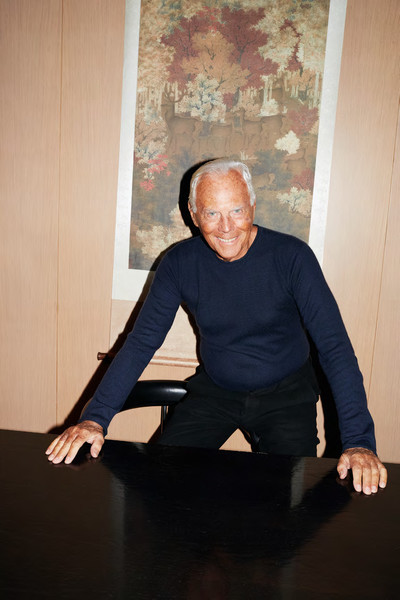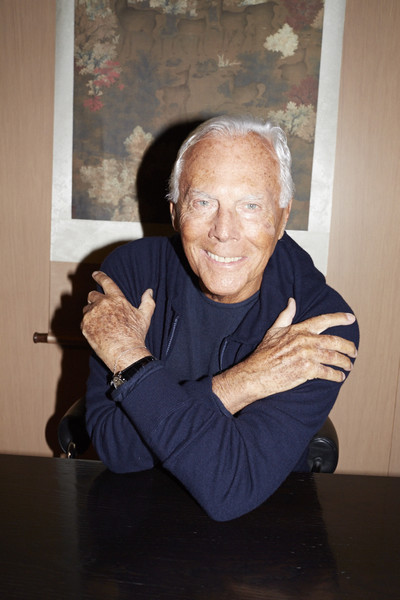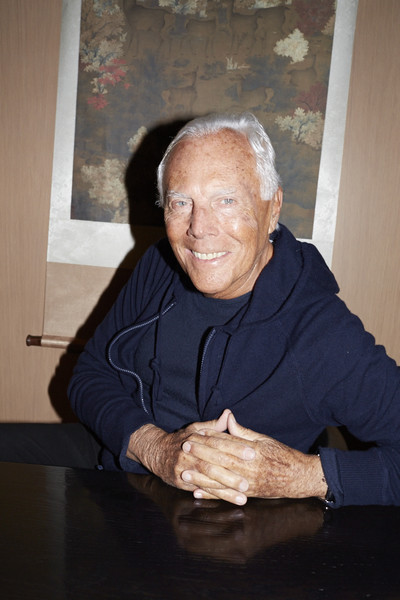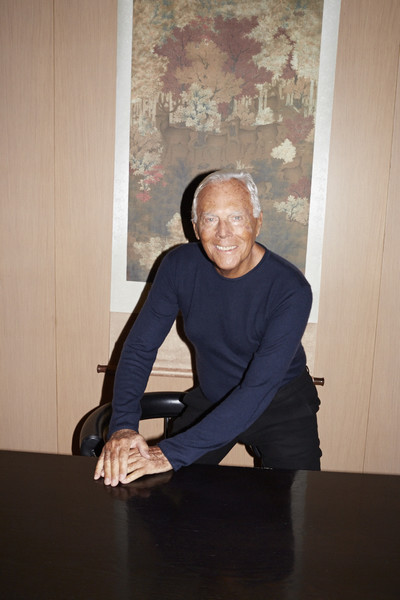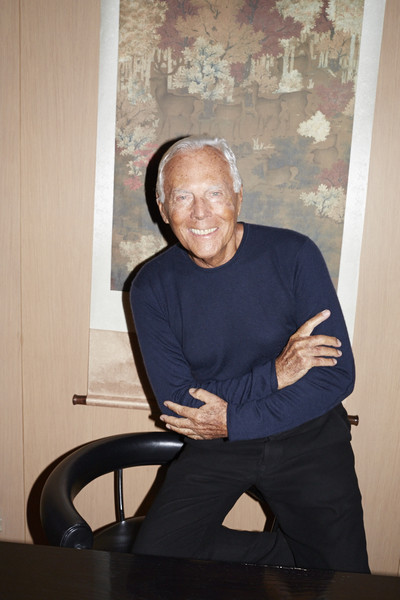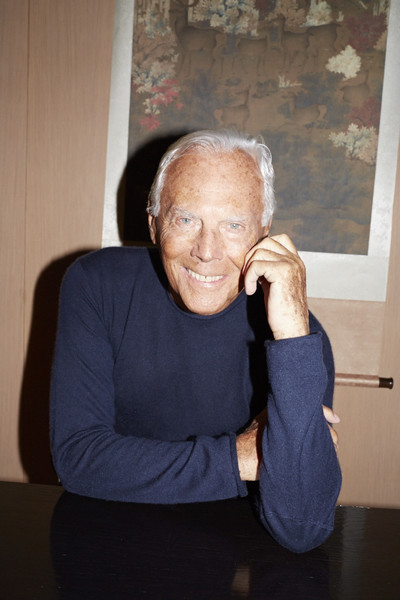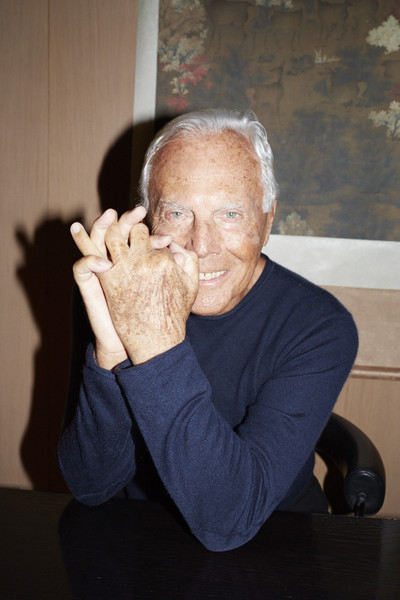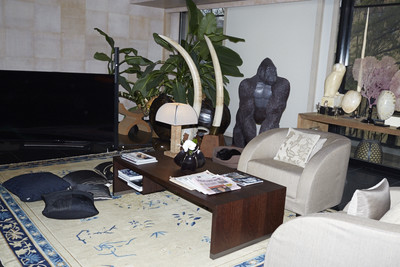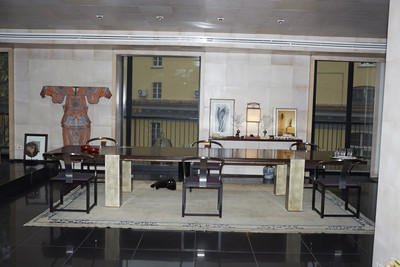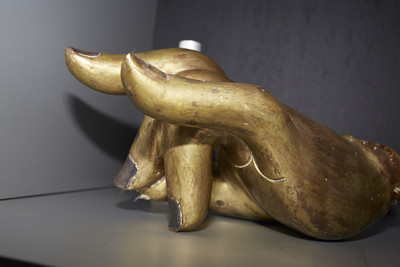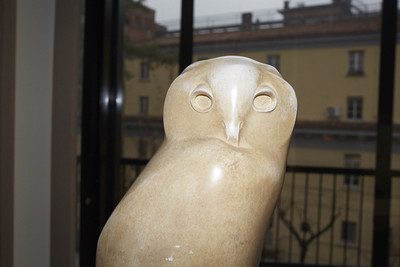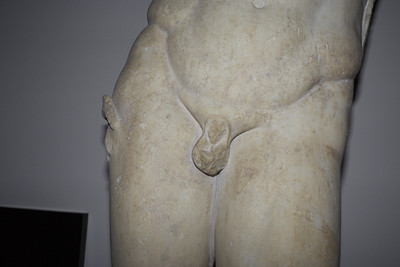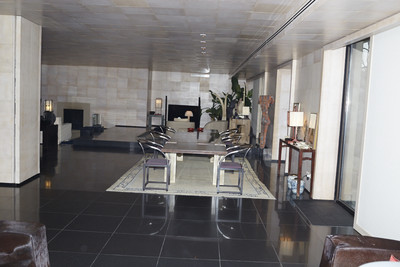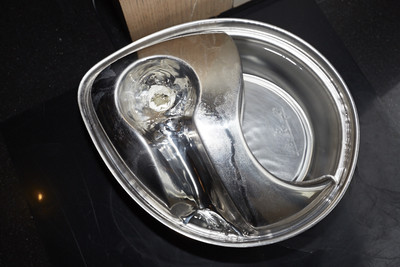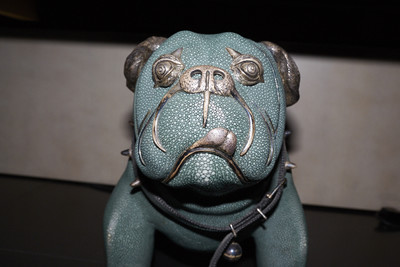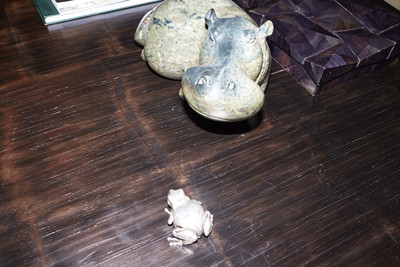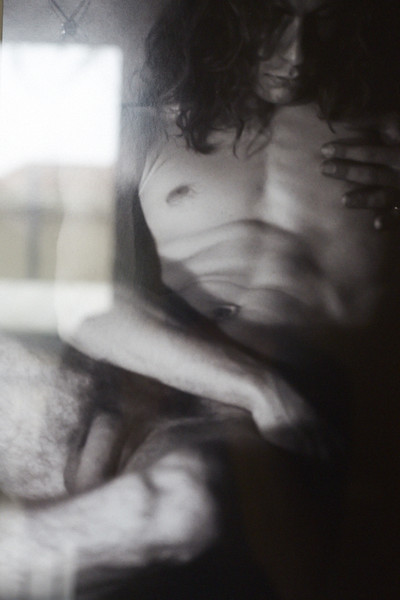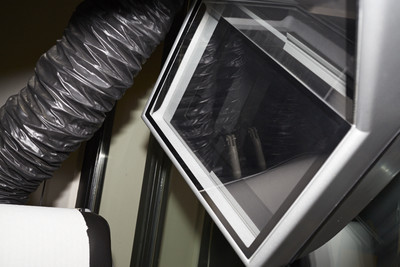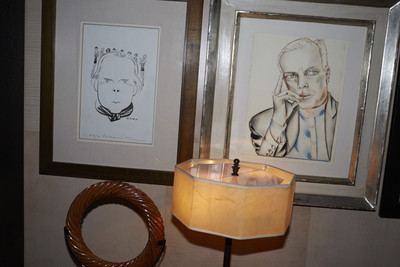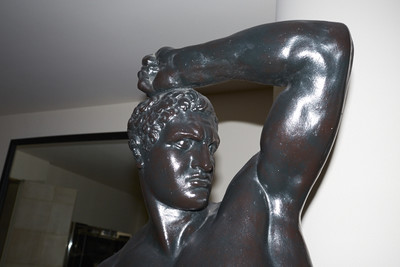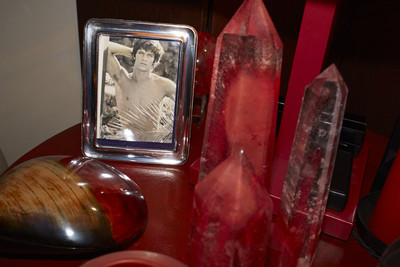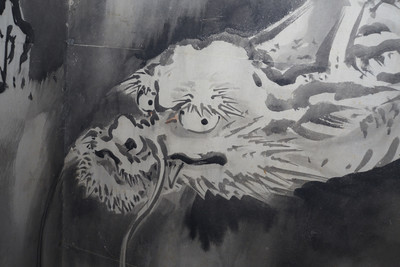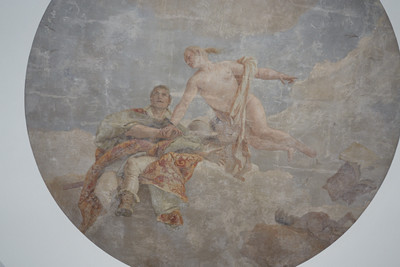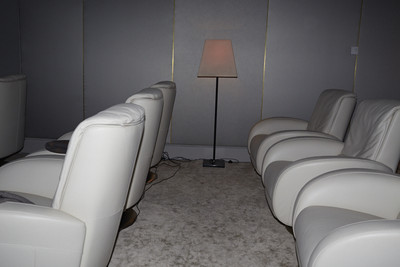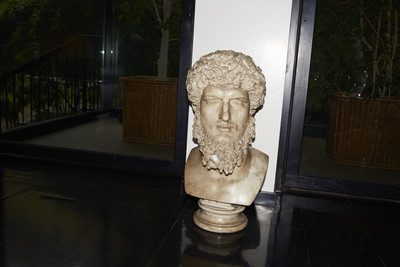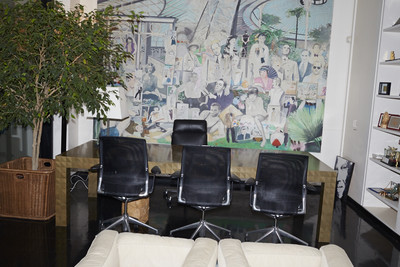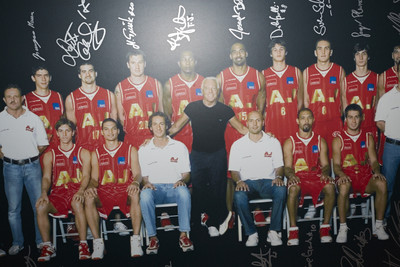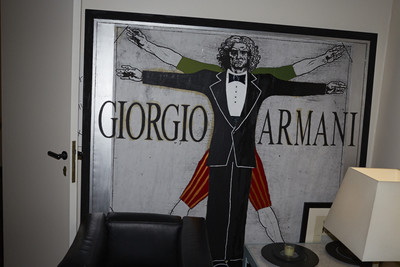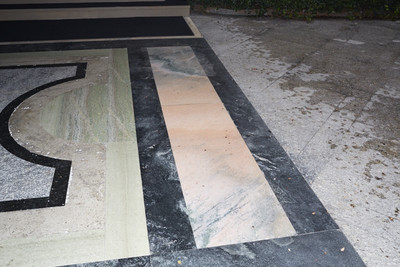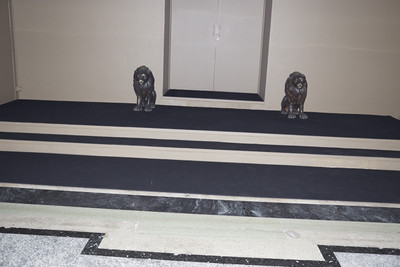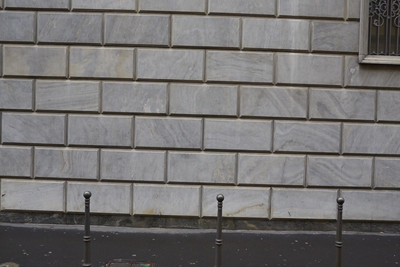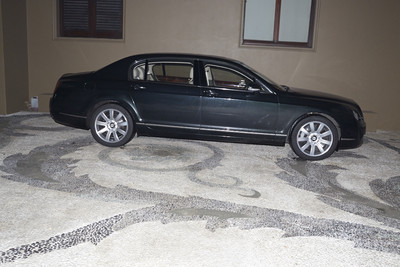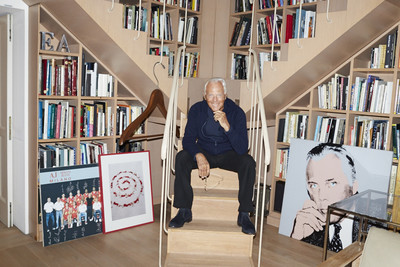There’s nothing ‘indie’ about Giorgio Armani’s independence.
By Giampietro Baudo
Photographs by Juergen Teller
There’s nothing ‘indie’ about Giorgio Armani’s independence.
Over the course of 40 years in an industry of change and reinvention, Giorgio Armani has marched to the steady beat of his own drum. Describing the essence of what he does as a search for “linear and ostentatious elegance” applied across an empire that spans ready-to-wear, couture, numerous diffusion and cosmetics lines, furniture, hotels and even food – it’s an aesthetic fidelity that turns over €2 billion for the company each year. And crucially, it’s a company that is neither publicly traded, nor part of an ever-expanding international luxury conglomerate – instead, Giorgio Armani S.p.A. remains entirely in the hands of the man whose name adorns its labels; a man with no formal business training, whose first foray into fashion, following a stint in the army in the early 1960s, was as a window dresser.
It was in 1980 that the name Armani stamped itself on the world. Having dressed a young Richard Gere in Paul Schrader’s American Gigolo – in which he designed a “jacket to be as fluid as a cardigan; elegant, but loose”; an unstructuring of the male uniform that changed both the way men and women across the world dressed – the big screen’s global resonance gave rise to ensuing Armani-mania, from which the 80-year-old Italian icon has amassed an estimated personal fortune of €7.8 billion.
Creativity and commerce: both are under Giorgio Armani’s control – but despite the self-proclaimed designer-businessman’s decades of experience and success, he still has doubts the night before a show. It’s an issue of “trust”, he tells System from the comfort of his personal residence, just moments away from the company’s headquarters situated on via Borgonuovo in the Brera district of Milan. This trust is formed between his brand and its audience, one that has been cultivated by the unwavering desire and discipline of its founder and CEO. In the following conversation, Mr Armani takes a rare moment to sit down and discuss risk and regrets, what will happen to the company beyond his lifetime, and those moments when it gets lonely at the top.
Giampietro Baudo: Mr Armani, after 40 years of work, are you happy today?
Giorgio: Yes, I have to say that I am just as happy today as when I began 40 years ago…
So how do you manage to cope with what must be an extraordinary workload? And how have you structured the company?
Giorgio: More than 9,500 people work for the group throughout the world. And obviously, the management of a business so extensive and complex requires complete and constant attention. So, my alarm clock goes off every day at seven a.m. and, after physical exercise and a healthy breakfast, I arrive at my office more or less at nine. I spend my day at the company’s various headquarters and offices, giving equal attention to the management of the business as to its creative elements — I think of myself as a ‘designer-businessman’. Between the seasonal fashion shows in Milan and Paris, and the numerous other events connected with the fashion house, the weeks pass by pretty quickly as I constantly follow this schedule.
Do you ever take time off?
Giorgio: I only allow myself short holidays in August and December – to recuperate.
Do you still enjoy the punishing work rate you’ve given yourself, after so many years?
Giorgio: All I can say is this: when I know I have a work appointment the following day — to visit one of our workshops or ateliers — I honestly can’t sleep the night before. I’m constantly getting up to check my alarm clock. And when it finally goes off in the morning, I’m happy. I just love being in contact with the people who are actually working to make the clothes; I enjoy the manual nature of the work and being able to spend time in the workshop. Even today, after 40 years, my enjoyment is like that of a child.
Was creating a company like the one you have now a childhood ambition? What do you think triggered the desire to do this?
Giorgio: Absolutely not, the idea came much later. I was a timid child, not at all out-going. Part of that was down to the dominating presence of my brother, a person with great charisma and extraordinary beauty; and I certainly felt a bit of a latent rivalry between us… As I grew up I didn’t know what my career would be for years and years; perhaps I wasn’t fully aware of what was going on around me. [Thinks out loud] What did I want to be as a child? I didn’t think of becoming a designer… No, I mainly wanted to become a doctor, but perhaps also a writer or traveller. I love this world and the idea of being able to go out and explore it certainly appealed to me – even though that’s never been enough for me.
How have you managed to create and oversee such a successful fashion company — and maintain that for 40 year, despite having no formal business training whatsoever?
Giorgio: I can only talk for myself, but I’d have to say that learning on the job is often more effective than what any traditional training can offer you. I learnt about business day-by-day – while it was happening. So just going to work every day was my training college; and I’m so lucky to have had it like that.
Did you have a specific business model in mind when you started your career?
Giorgio: I have always had a strong, burning desire to realise my full potential – fashion only came into the picture once I’d abandoned the idea of becoming a doctor. I immediately understood that this was the field in which I’d be able to fully express my vision. Once I’d realised that, everything happened in a natural sequence of events. I have no formula to pass on to others because I didn’t follow a formula myself, nor was I inspired by any other existing business model. I’ve always done everything my own way and continue to do so with a stubbornness that means even now I keep hold of my independence – it’s the most precious thing of all. If I had to describe my career using just a few words, I would say passion, risk, tenacity and consistency.
‘I have no formula to pass on to others because I didn’t follow a formula myself. I’ve done everything my own way and stubbornly continue to do so.’
Am I right in saying that it’s this risk and tenacity that’s prevented you from giving in to the temptations of outside investment?
Giorgio: The decision to keep complete control of my business – of my independence – for me was, and is, both quite natural and quite necessary. I am a designer-businessman, and my vision of the business is integral to my way of working in the design sector. I must admit that maintaining my independence is not easy today, and I am constantly courted with ever-increasing insistence. Staying independent requires a tremendous amount of effort, as I find myself having to deal on a daily basis with competitors who are true titans of the business world. The temptation to give in is always there, but then I think I’d end up losing control — and that I’d no longer be able to create anything how I really want it — and so I resist.
Do you still have dreams, or regrets, after 40 years of your business?
Giorgio: I look to the future in different ways now. 40 years is a long time to be in the fashion world — a long, long time — especially the way I have lived them. I’m still always thinking of the future; maybe it’s a future on the decline as opposed to a healthy future, but that’s the way life goes. And it’s a life that’s dealt me a great hand. I feel today like I did ten, even 30 years ago: confronting the same issues I’ve always had about establishing my brand across the world, and I still experience the same doubts the night before a fashion show that I’ve always had. But the excitement never leaves; right now I’m excited by the great Expo20151 event in Milan, and by the opening of my museum – they’re no different from the challenges I was experiencing on the very first day of the company, and I’m working like a maniac to ensure their success.
You mentioned consistency before. What’s been the one constant in the 40 years of your company?
Giorgio: If I look back, I have to say that there has only ever been one consistent thread running through my life: I’ve never let even the smallest detail pass by without checking it. I’ve never ever said, ‘Who cares?’ even if it was only something that appeared to be insignificant.
Let’s talk about how you took the Armani brand to the world. What motivated you, and how did you manage this?
Giorgio: The expansion of my business, across all the different areas, has been driven by my desire to produce not just fashion, but an all-encompassing Armani style. I wanted my aesthetic vision to be applied not only to clothing, but to many other contexts. From a business perspective, this made it possible to establish diverse profit flows, all stemming from the value and identity of the Armani brand, and that would never have been achieved had we operated in clothing alone.
But was there a specific moment, or event, which lit the fuse for the brand to expand internationally?
Giorgio: I think it was the decision to contribute to creating the costumes for American Gigolo. It seemed a perfectly natural move for me at the time, because I’d always had an interest and passion for cinema. It was a decision motivated not by business strategy – even though it translated into a phenomenal success – but through the immaterial world of cinema. And it was thanks to cinema that my style entered the public consciousness and captured people’s imagination. I could never have imagined that costumes in a film would have led to the growth of my business, but that’s just how it worked out.
It led to Armani becoming a universal style reference – everyone in the world soon knew what the Armani aesthetic was all about. How have you managed to stay true to the codes and values of your house over the years, as the business has evolved?
Giorgio: By staying on a consistent path, dictated by a never-ending search for new yet harmonious lines, innovative materials, sophistication and quality. My idea of style and taste is no different from when I started out; I’ve always sought to express a deep appreciation for all that is simple and linear. Times have obviously changed since 1975: men and women have gradually freed themselves from the protocols and rigid attitudes of the past, and found different ways to express their own personalities. I’ve always wanted to keep up with the times, but without distorting the essential characteristics of my philosophy and aesthetics.
‘10 percent of customers would praise me if I revolutionized my style; the other 90 percent would be left confused. It’s the 90 percent that terrify me.’
But wouldn’t you like to write a new chapter of your aesthetics today, one completely different from that of the past?
Giorgio: Yes, I’d be really happy to: sometimes I think about changing, and about revolutionising my style. If I were to do this with a collection, 10 percent of customers will praise that change to the skies, while the other 90 percent are confused. It’s the 90 percent that terrify me, and I feel the whole responsibility of estranging such a large number of people who are so important for the stability of my Group – those customers who want something from us which, at first glance, is immediately recognisable as Armani. When I travel, I look around at what my colleagues in the fashion industry are doing and I see the most beautiful things; things that make me realise that the world has changed and is continuing to change. I’m not talking about those designers who are simply puppets in thrall to a particular kind of trendiness, but those designers who have a healthy alter-ego, capable of making the sums add up; so that it’s then possible to convert a beautiful object into something successful.
On precisely that point, many successful fashion brands have been the fruit of two people working in a great creative and business synergy: such as Miuccia Prada and Patrizio Bertelli, Yves Saint Laurent and Pierre Bergé, Tom Ford and Domenico De Sole – yet you are in command on your own…
Giorgio: I don’t consider the artistic component to be in conflict with the business component. I define myself as a designer-businessman, and my vision of the business is integral to my way of working with fashion. When we started the business there was a divided model: Armani on the creative side, Sergio Galeotti on the business side. Sergio’s early death forced me to revaluate everything. I realised immediately that in order to grow the business as I wanted, I had to maintain my independence — and to achieve that, I had to take things into my own hands, including from an economic perspective. It was a natural development, albeit a highly demanding one.
Does it ever feel lonely at the top?
Giorgio: A bit, yes. Success like mine requires total commitment, so much so that it takes up my entire life. For the most part, I’ve had to give up affection and time for the sake of work. In reality though, I have no regrets.
If you had to draw up a balance sheet, what have you missed the most over the past 40 years?
Giorgio: Giving attention to the people around me. I have always loved my work dearly, which in turn has led me to committing to even more work, and with the most blurred of lines between my private life and my business. Once you are a businessman, you never stop being one. If I’m honest, I must admit that I’d have liked to have had a bit more quality time with the people around me; to have enjoyed myself in moments of healthy and simple pleasures. I don’t like transgressive behaviour of any kind; I consider infidelity to be too precarious, volatile and dangerous. My work has had an important role in my life, it has been defined by it. It hasn’t allowed me breaks, but it has nonetheless given me great success. Ultimately, when I’m brought the bill, I can see my life as having been punctuated by the occasional difficult moment, but these have been set off against the regularity of the wonderful ones.
How do you manage to delegate while maintaining control over your creative and business worlds?
Giorgio: Surrounding myself with the right kind of people in whom I can place the greatest trust. At the same time though, I am still the one who makes the final decisions.
Doesn’t it become a bit of an obsession managing a business like yours?
Giorgio: I wouldn’t call it an obsession although it is certainly a constant and total commitment. I have to say, it is very rare for me to lose sleep or wake up in the middle of the night because of work. When it happens, it’s only for the most serious of reasons.
And you never wake in the middle of the night with an idea you have to write down there and then?
No. If inspiration is deep enough it is well-rooted, and it’s still there when the morning alarm goes off. I sleep only as much as is absolutely necessary, but it is restorative sleep. As I said before, I’m always awake by seven. I’ve always got up early – I used to think it was out of duty, but I’ve discovered it is actually a great pleasure because it follows the natural rhythm of the day.
‘Italian brands being absorbed by French luxury groups has impoverished our industrial fabric. Each time it happens, a piece of Italy goes with it.’
Have you ever had moments when you have been under great pressure or stress? And how do you deal with this?
Giorgio: I’m responsible for a big business so I’m only too aware of what stress is. Normally though, I find it a positive experience, something that stimulates. What it comes down to is that stress is a challenge; it only becomes negative when you lose control of the situation or when you’ve been unaware of serious problems. I do my best to avoid both these kinds of situations.
What do you know about the business that you didn’t 40 years ago?
Giorgio: I understood from the start that communication is important, but the true basis for success is the authenticity of the product. By product I mean a jacket or pair of jeans just as much as the environment or the service found in my hotels.
What is the greatest risk you’ve faced in growing your business?
Giorgio: Maintaining my independence is a constant risk but it’s something I’ll never give up. I’m proud to have believed in it so strongly and to have done everything to defend my uniqueness; I’m proud of the fact I’ve always believed in my approach to fashion, and been faithful to that idea.
How important are the values of consistency and fidelity to you?
Giorgio: They are of fundamental importance whether one is talking of love or work… The things I care for passionately are long-lasting and deep-rooted: consistency has been a thread throughout my life. This is true both in business and on a creative level: the marriages with my production partners and managers are always long-standing, and it’s also true at the creative level. I hate this idea currently popular in some areas of fashion where everything has to change every six months; it’s futile. I love the idea of having succeeded in making my own aesthetic outlook unforgettable.
What are you most proud of in your career?
Giorgio: There are obviously the times where I have been given recognition; such as the cover of Time magazine in 1982 and, more recently, the Giorgio Armani Day in New York in 2013. This served as confirmation that my work has gone in the right direction, and that I have genuinely touched peoples’ lives. However, the thing I am most proud of is the fact that over 40 years I have been able to create the complete Armani lifestyle, which mirrors my ideas and can be applied to many sectors beyond the fashion world; such as interior design and hotels. Over all these years I’ve tried to create atmospheres, going beyond simply clothing: atmospheres to surround people, to bring them into my aesthetic universe, the universe that occupies my mind.
What are your general thoughts on the fashion industry today?
Giorgio: Nowadays finance dominates the fashion industry, and the monopoly of large companies is a clear indication of this. Many historic brands have changed hands and the reasons are different every time: generational hand-downs, conflicts between heirs, divergence of strategies; all of this has led to the absorption of significant brands – Italian above all – into French luxury companies. While these companies have given the brands an international dimension, they’ve also impoverished our industrial fabric. Each time this happens, a piece of our country goes with it. Personally, I will never betray the relationship of trust I have with my clientele; because that is my strength and the basis of my style.
How would you define the difference between fashion and luxury?
Giorgio: Luxury is an overused term. I prefer the word authenticity: my creations express the true culture of Italian know-how. Fashion is simply the system which conveys these values.
In terms of business and strategy, what would you say distinguishes fashion from other sectors, such as smartphones, computers or hotels?
Giorgio: Fashion is always based on frivolous yet extremely profound impulses. It is the industry of change and renewal; it promises beauty and makes it a reality, with infinite changes every season. It is a business made from both extreme concreteness and volatility – it is so exciting, a continuous challenge, with parameters which never stay the same.
‘I’m surrounded by very capable colleagues who I’ve trained with succession in mind. Many of them are, paradoxically, even more ‘Armani’ than I am.’
What do you think of the democratisation of fashion by ‘fast fashion’ brands?
Giorgio: I believe that fast fashion has brought about a concept of speed and low-cost that has effectively changed the world of clothing. Personally, I thought about this market – which is a very interesting one, not just because of the price points – back in 1991 with the A/X Armani Exchange. It was not a low-cost collection, but a complete fashion line: a total urban look for consumers between the ages of 16 and 25, based on the fast-fashion formula.
Is success measured purely in terms of size and turnover – or are there other, perhaps intangible, values?
Giorgio: No, success is not purely defined by turnover. If I look at all the young designers I have supported over the years by allowing them to exhibit at the Armani Teatro… While they’re clearly small by comparison to me, I’ve been impressed by their ability to create their own niche in the market, and how they’ve achieved success through great perseverance.
Why have you set up this mentoring project within the Armani Teatro?
Giorgio: Having got to this point in my career, I understood it was vital to give young people — the designers of tomorrow — some help. A designer’s job is so tough: every six months, no, every day, you have to question yourself in order to understand whether you’re creating the right thing; to understand whether a particular coup de théâtre is right. I believe, however, that there is one ultimate secret of thought, of creation, of product — and that is truth.
Are people born designers, or can these skills be acquired over time?
Giorgio: I think you pick up skills with experience, but the initial talent is innate.
Are there other brands or designers that interest you today?
Giorgio: I am interested in authentic businesses, which push forward the values of their respective fields.
Do you agree that today’s fashion designers need to become increasingly business-minded? And then, conversely, those working in the business side of the industry must be more sensitive to creativity?
Giorgio: This issue has always been important to me. Our job is one which balances creativity and commerce, because alone each one is crippled. Creativity alone can become an end unto itself, and excessive commerce can lead to [creativity] drying up. Finding a link between the two requires a lot of attention, but above all the will to question yourself – and that’s the same for both creative people and business people.
What piece of advice would you give to a young designer?
Giorgio: Remember that a collection is an idea that’s grown over six months, and it needs six months of commitment, and of work. From an economic standpoint also remember that, when creating an object, you need to think about its marketability. Also, try and create for tomorrow, because these days things are so unpredictable.
To what extent does human management, of both creative and business staff, take up your time and energy? And in what ways does good people management drive a successful business?
Giorgio: Managing staff takes a lot of my energy, but it is vital. By feeling involved with me, my staff really become part of the company; thus they all work together towards a goal.
Have you ever thought about taking a step back?
Giorgio: Honestly not. My life and my work coincide, so taking a step back is something I’ve never contemplated.
How much more can your company grow, while maintaining the balance between quality and your values? Can the Armani universe ever get too big?
Giorgio: The constant growth has never involved me turning my back on quality. I have never looked for growth for growth’s sake. There is not a size which is too big for the Armani brand, but for me, everything needs to happen in an organic manner.
What maxim has guided the company over the years?
Giorgio: I can sum this up with one word: independence. It is the only value I believe in; it allows me to grow and to express myself authentically.
How do you see the future of the brand?
Giorgio: I have had many different people approach me to propose a variety of partnership types… and each time I ask myself one simple thing: ‘Is it worth it?’ My response has always been guided by one certainty: I don’t like being a spectator, or having to accept the thoughts of others.
It’s very clear that you are an exceptionally organised and disciplined individual – do you have a specific plan in place for how the company will look and operate beyond your lifetime?
Giorgio: Nowadays, I am surrounded by very capable colleagues: people that I have trained and helped grow with succession in mind. In this company there are many people who work with me who are, paradoxically, more ‘Armani’ than even me. Everything will depend on how they manage the absence of the, let’s say, ‘genius’ – the creator of atmospheres – in keeping the business going. I can, however, assure you that everything is in place for, when the time comes, my team to operate completely independently.
